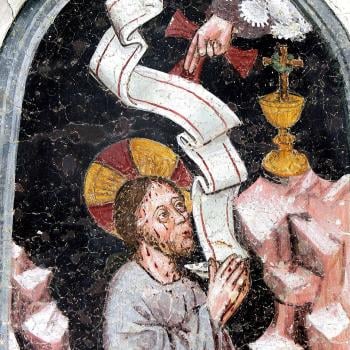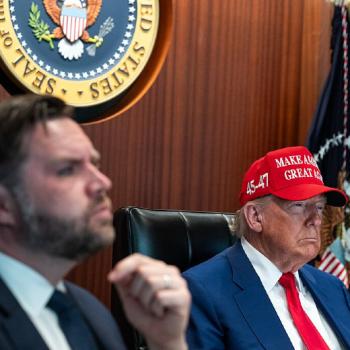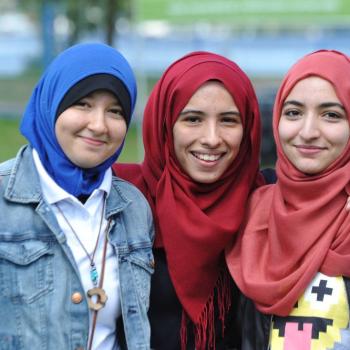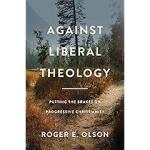For the most part, the majority of ancestors seem to like food offerings though. I usually, with the exception noted above, tell people not to eat food that's given to the dead. It's theirs. You wouldn't want someone eating off your plate after all. When the time comes to discard, if you're able, put it outside, but if not, simply throw it in the trash. Be respectful, of course, but understand there's no onus on having to discard used up offerings in the garbage can. Deal with it the way you would the remains of a dinner party. That's my rule of thumb.
Question 4: Why do you knock when calling on your ancestors?
This is something that many of us have picked up from African and Afro-Caribbean traditions. It is a reminder to us and acknowledgment to them that they are our roots, that this is not about being in the head of over-intellectualization; it's about a connection that is deeply rooted in our very DNA. It's in our gut, in the blood, pain, struggle, piss and shit of living. It is a reminder to get down and honor those roots.
Question 5: how would you go about honoring ancestors when you have no connection to their culture or their God(s)?
This can be a real sticking point in developing an engaged ancestor practice. It's so much easier to honor those ancestors with whom we feel some measure of connection, after all. So firstly, don't beat yourself up because you don't feel a connection with a particular set of dead people. It's normal. It happens. Sometimes it may be that ongoing work is required to access that line. If that's the case, you'll find out as you grow more deeply into your ancestor practices. I would simply include that particular line in my offerings. Even if you feel nothing, thank them and make the proper offerings. It will benefit you in the long run and may actually help heal and strengthen that line so you can access it. Basically: fake it till you make it is a good rule of thumb.
Question 6: If one feels no connection whatsoever to blood ancestors, how does one go about creating a relationship?
The first thing I usually suggest is to set up an ancestral altar or shrine and begin engaging with them by way of offerings. It doesn't have to be elaborate: a glass of water, a candle, maybe some flowers, and most of all your time and attention. Talk to them. ask them to be part of your life and look after you. Thank them. you have ancestors stretching back to the very beginning of human life, to the moment the first amphibian crawled out of the primordial muck and decided to give land living a try. If the most recent generations of your blood ancestors are unhealthy or hurtful for you, go further back. Go as far back as you have to go. You don't need to know their names either in order to honor them. they all know you. They are connected to you by an endless line of births and deaths, of experience, of hopes, dreams, and struggles. Honor that.
There's also an excellent book currently available at www.asphodelpress.com called "Weaving Memory" by Laura Patsouris. It's a very good guide to working with your ancestors and figuring out how to do all this "right."
"Right," by the way, is very subjective. There's no one way to go about this really. There's engaging deeply and consistently and all that might entail. Each person is going to develop their own unique way of doing things, because in the end, our ancestors will guide us in this process as much as anything we read.
Most of all, be patient. It took me over ten years to develop a really strong, engaged ancestor practice. It was hard and sometimes frustrating work until one day it clicked. Now it's one of the most rewarding aspects of my spiritual life. Just be patient and keep at it.
Question 7: What happen when your ancestor are from a different religion (usually Christians, but they could even be atheists) that you are? Could you honor them the same way? Do they want to be honored by another religion's rites?
I've only rarely found this to be a problem, and then there were other issues impacting the relationship as well. In the majority of cases, it's not an issue. Honoring the dead need not include calling on any specific Deities. It's a process of engaging with your ancestors. Even if all your ancestors were Pagan, it's likely they might have been devotees of different Gods and Goddesses which can be every bit as complicated as having a house full of monotheists.
I would say honor them and be open to allowing them to guide the process. I have a grandmother who had a deep relationship with the Virgin Mary. So, one day I was getting pushed very, very hard to buy a statue of Mary. Now I'm Heathen. I don't have any type of relationship with Mary but I bought the statue. It arrived and I had it tucked under my arm and was walking around my house wondering why on earth I bought it and I crossed in front of my ancestor altar. Immediately I knew. I looked at my grandma's picture and went 'YOU!'. Well, the upshot of this is that she now has a Mary statue next to her photo on my altar. I don't honor Mary at all, but she did in life and I guess that's something she wanted in death too. Another ancestor pulled the same thing with Ganesh. I just go with it. It's their altar/space after all and you're honoring the connection, their influence, their support not their Gods.





